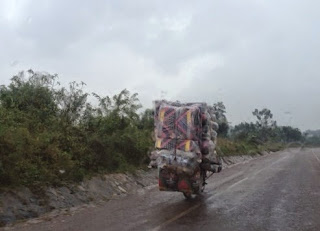G
Greetings
Greeting someone properly in Uganda is far more important than saying 'please' or 'thank you'. You should never start speaking to a colleague or a boda driver or someone in the bank or a shop without first greeting them and asking how they are. If you know someone well then you also ask if they have had a good evening or weekend and how their family are.
Goats
Along with chickens and cows, goats are seen in most villages and along the roadside. They are very good at clambering apparently impossible banks or ditches to find a particularly attractive clump of greenery. Goat also features heavily on local menus as a cheap easily available meat. I'm not particularly keen as it's often very bony and grisly.
In the highlands they are easily mixed up with sheep as the 2 look surprisingly similar unlike our fluffy white sheep in the UK.
Grey Crested Crane
A beautiful bird and the symbol of Uganda, appearing in the centre of the flag and on the national crest. They are not particularly common but we've seen them around Kampala and on the shore of Lake Albert in the Murchison Falls National Park as well as in the Wildlife centre in Entebbe.
H
Health Centres
While we've been in Uganda we've learnt to really appreciate the NHS in the UK. Through VSO I have extremely good health cover but for many people, particularly in rural areas, it's a different story. In the area of West Nile I visit from time to time there is only one Health Centre III serving a very large area including many villages. Very few people have any form of motorised transport and the roads can be impassable in the wet season so most people can only walk, or at best cycle, to reach it. Even when they get there an HCIII will often only have a nurse available with the nearest doctor in Nebbi town. Is it surprising that women don't travel for ante natal care and give birth at home in their villages with only traditional supporters and without medical back up?
I
Independence
Uganda gained independence from the UK on 9th October 1962. This is commemorated in many places with the date written on the wall outside the parliament building in central Kampala and in many towns and villages around Uganda. Each year the date is celebrated with a public holiday, parades and feasts. The president attends the celebrations in a different place each year.
J
Jinja
Jinja is probably one of the best known and most visited towns in Uganda after Kampala. The road from Kampala to Jinja is one of the busiest in the country and the journey of around 80km can easily take 3 hours. As well as connecting two of the largest towns in Uganda it is also the main road to the border with Kenya.
Jinja is well known as the place where the Nile leaves Lake Victoria and starts it's long journey to the Mediterranean. Just north of Jinja are many rapids giving some of the best white water rafting in the world. The main centre for rafting used to be at Bujagali Falls but a hydroelectric dam has turned the rapids into a peaceful lake. This is still the area where many of the lodges and camp sites are situated and people who want to go rafting are transported further downstream to the Kalagala Falls.
K
Kampala
Kampala is the capital of Uganda and our temporary home for our 2 years here. It's an interesting city with many contrasts. Just over a year ago there is a blog post on Kampala dated 11 May 2014.
To be continued ...














